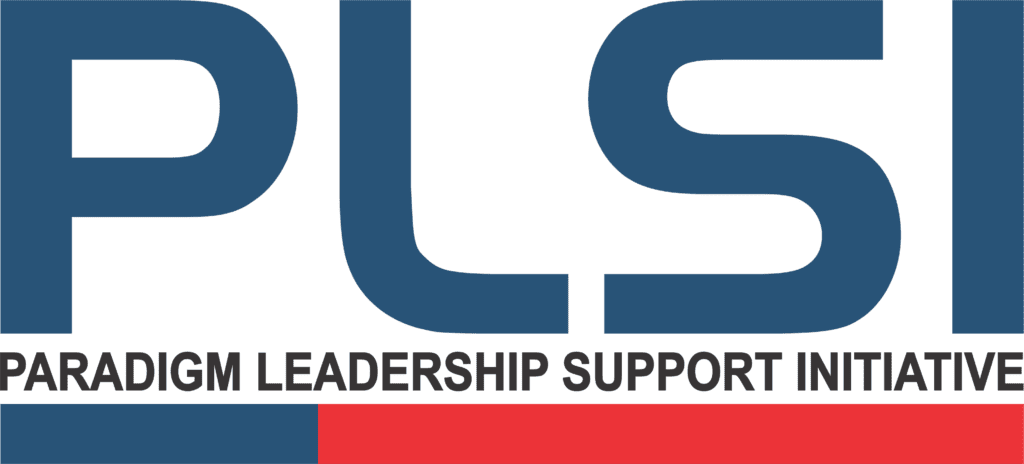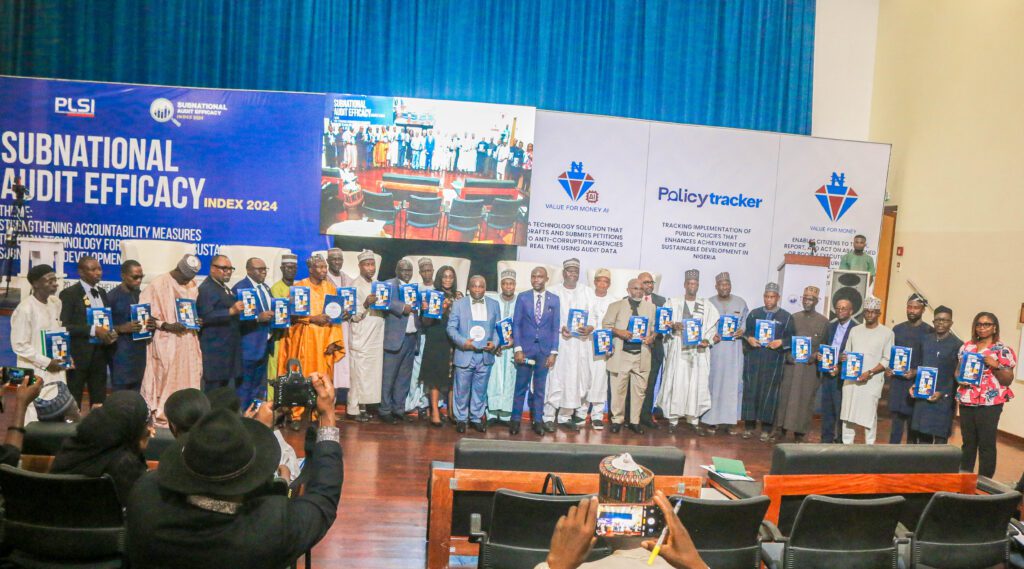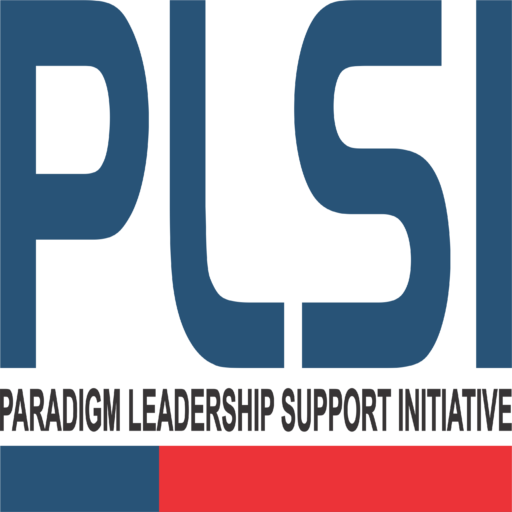In reaffirmation of its commitment to strengthening public accountability in Nigeria, the Paradigm Leadership Support Initiative (PLSI) launched the fifth edition of its flagship research report, the Subnational Audit Efficacy (SAE) Index 2024, at a high-level public event in Abuja on Thursday March 20th, 2025. The event brought together a cross-section of accountability stakeholders from government, civil society, the legislature, development partners, the media, and Supreme Audit Institutions in Nigeria.
The SAE Index 2024, which assesses the level of transparency and accountability operational in the management and utilisation of public funds, as well as implementation of public policies, across all 36 states of Nigeria, marked a significant moment in the country’s pursuit of improved governance, citizen engagement, and responsible public finance management.
A Scorecard That Matters
In his welcome address, Olusegun Elemo, Executive Director of PLSI, highlighted the historical significance of the SAE Index. “Now in its fifth year, the SAE Index was launched in 2021 as PLSI’s annual scorecard to assess the temperature of public finance management and policy implementation at the state level,” he explained.
According to him, the 2024 Index not only continues this tradition but also introduces the next frontier: “Following the Supreme Court’s landmark judgment affirming the financial autonomy of Nigeria’s 774 Local Government Councils, PLSI will adapt the SAE Index methodology in 2025 to include assessments at the local government level,” Elemo announced.
Keynote Address: Audits in the Digital Age
The keynote address was delivered by Mr. Ayodeji Ogunyemi, FCCA, Partner and Government & Infrastructure Lead at EY West Africa. He delivered a sobering yet forward-looking speech:
“If a State Audit Office in Nigeria still lacks a dedicated website or social media presence in 2025, it is inexcusable.”
Ogunyemi stressed the need to digitize public audit institutions, not just for transparency but to foster citizen engagement and build trust. He provided a roadmap for integrating technology into audit practice, urging subnational governments to embrace innovation for greater accountability.
Ranking Highlights
The SAE Index 2024 revealed a mixed bag of results. For the second consecutive year, Yobe State emerged as the top performer with a score of 73%, followed by Ekiti State (54%) and Adamawa State (47%). These leading states were commended for sustaining strong public audit practices despite the post-SFTAS reform decline experienced nationwide.
At the other end of the spectrum, Ogun, Bayelsa, and Ebonyi States were tied for last place with a dismal score of 7%, raising red flags on audit engagement, financial transparency, and governance practices in these states.
The awards were presented by H.E. Kashim Shettima, Vice President of Nigeria, ably represented by Barr. Bashir M. Maidugu, who commended Yobe and other top-performing states and challenged others to rise to the occasion.
Celebrating Champions of Transparency
Beyond the rankings, the event also celebrated states making notable efforts to enhance public audit and fiscal openness. Eleven states were recognized for publishing Citizens’ Accountability Reports (CAR) for the 2023 fiscal year—an essential transparency tool for citizens to understand budget implementation and service delivery.
Awarded States for CAR Publication:
- Adamawa
- Akwa Ibom
- Bauchi
- Benue
- Edo
- Gombe
- Jigawa
- Kaduna
- Ondo
- Oyo
- Yobe
Also honored were Adamawa and Katsina States for taking bold steps towards conducting performance audits, signaling a renewed push for result-oriented public finance scrutiny.
Thought-Provoking Panel: Tech for Transparency
A key highlight of the event was the panel discussion moderated by Mr. Odeh Friday, Country Director of Accountability Lab Nigeria, who led a compelling conversation on the theme: “Leveraging Technology Tools for Improved Public Audit Practices and Service Delivery at the Subnational Level.”
Panelists included:
- Sunday Adegoke, Chairman, Body of Federal & State Auditors-General (and Ondo State Auditor-General)
- Veronica Okonji, Auditor-General, Delta State (represented by Mr. Francis Agbayi)
- Eric Akpan, Chairman, Public Accounts Committee, Akwa Ibom State
- Ugochi Freeman, Executive Director, Creative Minds Centre for Youth and Community Development
Mr. Adegoke bemoaned the post-SFTAS funding drought, noting that audit offices have suffered setbacks due to reduced capacity and poor resource allocation. He emphasized the need to integrate technology and digital engagement into audit processes while maintaining ethical safeguards.
Mr. Agbayi, speaking for Delta State, shared the state’s experience of conducting its first-ever standardized performance audit, focused on solid waste management. He credited the achievement to PLSI’s training and technical support under the MacArthur Foundation-supported “strengthening public audit practices and accountability at the state level in Nigeria” project.
Hon. Akpan drew attention to the crucial role of Public Accounts Committees (PACs) in audit implementation. He called for greater legislative activism, executive buy-in, and robust laws to guarantee audit office autonomy and effective legislative oversight.
Mrs. Freeman added the civil society perspective, urging the use of civic-tech platforms to empower citizens, promote inclusive participation, and track government spending at the grassroots level.
Institutional Support and Goodwill
The event was further elevated by goodwill messages from top public finance, anti-corruption, and development institutions:
- Shaakaa Kanyitor Chira, Auditor-General for the Federation, reaffirmed the role of Supreme Audit Institutions in ensuring prudent use of public resources and praised PLSI’s consistency in strengthening the audit ecosystem.
- John Okor Odey, representing the Chairman of the ICPC, called for more than just audit report production. “What matters is implementation,” he said, noting that acting on audit recommendations is key to curbing leakages.
- Isiaka Mustapha, Head of Audit & Compliance at the Nigeria Governors’ Forum Secretariat, urged state governors to treat audit findings as governance tools rather than political inconveniences.
- Chris Okeke, Governance Team Lead at the FCDO, praised PLSI’s role in bolstering anti-corruption efforts and governance reforms.
- Dako Abeje Joshua, on behalf of the Accountant-General of the Federation, emphasized cross-sector collaboration between audit offices and financial regulators.
Beyond the Launch: What Next?
The 2024 Index revealed some troubling statistics: only four states are advancing financial autonomy for their Audit Offices, and 21 states failed to publish their 2023 audit reports online. These findings reflect a broader trend of regression in accountability post-SFTAS.
Yet, the 2024 Index also offers a glimmer of hope—technical assistance, political will, and civic pressure are moving the needle, as seen in the progress made by states like Delta and Yobe.
As PLSI looks ahead to the SAE Index 2025—which will expand to include local governments—stakeholders across Nigeria must build on the momentum of this year’s report. The journey toward institutionalized accountability is long, but with continued commitment and collaboration, the future looks promising.








